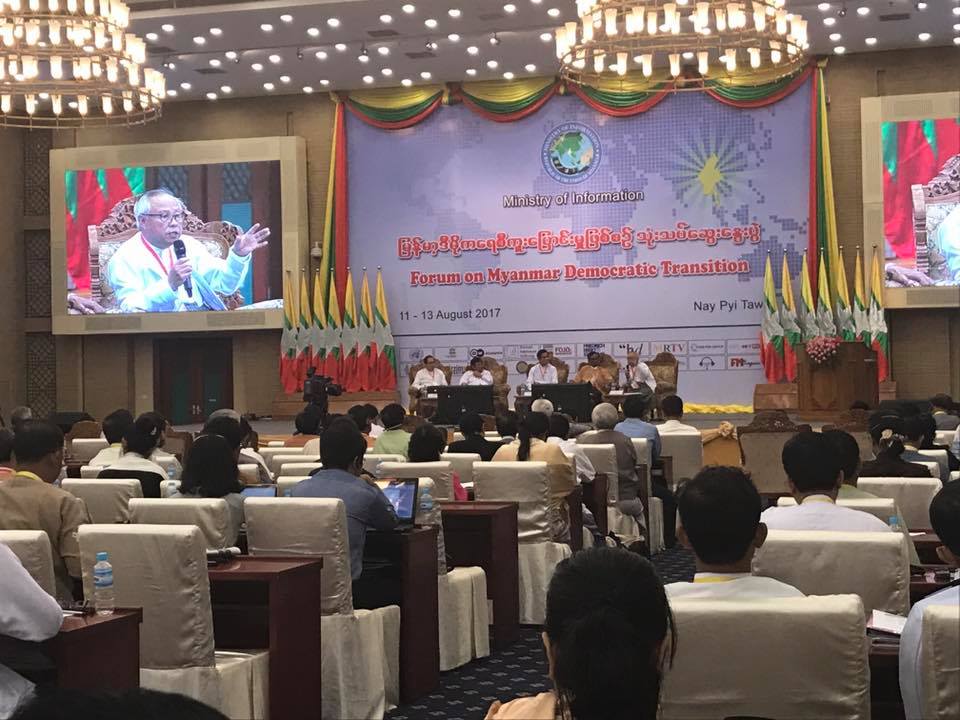Burma’s transition from dictatorship to democracy has largely been praised by the international community since reforms kicked off in 2011, a time when elsewhere in the world — particularly the Middle East and its “Arab Spring” — brought bloody political convulsions and uneven progress toward more liberal, democratic orders.
By contrast, the Southeast Asian former pariah state’s evolution has been relatively peaceful and smooth, backers both within and outside the government say.
But as hundreds of people gathered in Naypyidaw over the weekend for a forum on Burma’s democratic transition, questions about that process remained.
Central to the uncertainty is the continuing role of the military in Burma’s politics: Though the ruling National League for Democracy has clearly bought into the reform process, two of the party’s biggest campaign promises in the lead-up to the 2015 election in which it swept to power — bringing peace after decades of civil war and amending the constitution — will not be possible without the military’s cooperation.
As things stand, the military has constitutionally enshrined power to play a part not just in the country’s security, but also its politics.
Political analyst and writer Kyaw Win told DVB that prospects for amending the army-drafted 2008 constitution is dependent on the state of civilian-military relations, a major factor in the NLD’s emphasis on “national reconciliation” as key to Burma’s ongoing political transition in the party’s first 16 months in office.
“The civilian-military relations are like a race. If the civilian [aspect of governance] is strong, the military cannot influence the government. But the civilian sector is just started now. So, it will be difficult,” he said.
Civil-military relations came up repeatedly at sessions of the three-day forum on Burma’s democratic transition, which ended on Sunday. Panelists and attendees had plenty of thoughts and questions on the matter.
Most seemed to agree that the nature of that relationship was central to the fate of the country’s experiment in democracy after decades of military rule. Where opinions diverged was on the exact nature of the Tatmadaw’s continuing place in everyday life for the country’s 52 million people.
Security and national defence solely — that was the argument of political analyst Aye Maung Kyaw, who said these were the military’s only responsibilities under the constitution.
But a reading of that charter begs to differ: The military is afforded control of the ministries of Defence, Border Affairs and Home Affairs, the latter being one of Burma’s most powerful and expansive portfolios when it comes to the apparatus of state.
Changing that will require amendments to the constitution — and by design, the acquiescence of the military, which holds an effective veto over constitutional reform thanks to its guaranteed representation in the national legislature.
“Three ministries are ‘under’ the government, but the president cannot instruct them. The constitution gives that authority to the commander-in-chief,” said Aye Maung Kyaw.
“Safeguarding the Union against all internal and external dangers” is described as a primary responsibility of the Tatmadaw under section 339 of the constitution. It is beyond this remit where opinions diverge, sometimes dramatically so, regarding the nature of the military’s ongoing role in Burma’s political transition.
[related]
An article in state-owned media by Professor Chaw Chaw Sein, head of the International Relations department at Yangon University, said one possible way to construct the still-evolving civil-military partnership in Burma would be to look at ways in which both civilian and military sides of the aisle can cooperate — in meeting the needs of non-traditional security matters such as economic, environmental and maritime security, or on health issues, for example.
Among myriad opinions expressed at the forum in Naypyidaw, Colonel Aung Myint Oo, head of the National Defence College of Myanmar, said Burma’s democratic transition would be most likely to succeed if all stakeholders viewed the military as an organ of government.
“It is impossible to remove the military from politics, in reality. Local security issues would be solved best if the government is strong. The military is being used by the government to solve those security issues,” he said.
Burmese tycoon Serge Pun, chairman of First Myanmar Investment, told forum participants on Friday that people want to see the civilian government and military in harmony, while acknowledging that the latter needed to be reformed in the process of democratic transition.
“We need stability with democracy. We need to reform the military, not undermine its importance in national life,” he said.
Burma’s democratic transition has captured the interest of not just a local audience, but also the international community. Several non-Burmese were on discussion panels or otherwise attended the 11-13 August forum, sharing their varied experiences of political systems undergoing change.
Retired Indonesian Lieutenant-General Agus Widjojo, governor of the National Resilience Institute (Lemhanas), called for mutual trust between military and civilian leaderships if Burma’s process of democratic transition is to succeed.
“In Indonesia, the army was ready to withdraw when it did. The situation in Myanmar is almost similar,” he said.
NLD lawmaker Phyo Zeyar Thaw suggested a more permanent state of affairs, however, saying his party was not looking to remove the Tatmadaw from its country’s politics.
“We accept that the military involves [itself] in the political sector,” he said.



